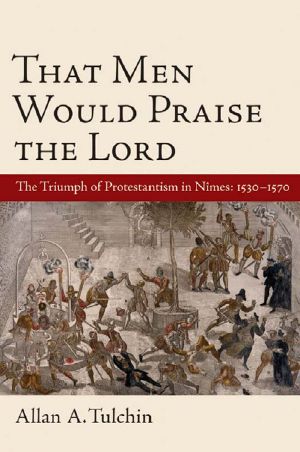That men would praise the Lord · the triumph of protestantism in Nîmes, 1530-1570

- Authors
- Tulchin, Allan A.
- Publisher
- OUP Us
- Tags
- italy , christianity , history , linguistics , naimes , language arts & disciplines , france , general , christian church , europe , religion , christian theology , nîmes (france) , reformation - france - nimes , nimes (france) - church history , reformation
- ISBN
- 9780199736522
- Date
- 2010-07-13T00:00:00+00:00
- Size
- 0.73 MB
- Lang
- en
That Men Would Praise the Lord breaks apart the process of mass conversion in the sixteenth century to explain why the Reformation occurred, using Nimes, the most Protestant town in France, as a case study. Protestantism was overwhelmingly successful in Nimes (since most people converted), but the process culminated in two bloody massacres of Nimes's remaining Catholics. Beginning in 1559, Nimes went through a revolutionary period comparable to 1789 in its intensity. Townspeople flocked to hear Protestant preachers and then took over Catholic churches, destroyed statues and stained glass, and zealously took part in the Wars of Religion, which convulsed France beginning in 1562. As the Protestant movement grew, it had to adapt to changing circumstances. Nimes's first Protestants were attracted to Calvin's theology. Later converts believed that the Church needed to be cleansed of its excesses to encourage moral reform and to assist the royal treasury. Iin the end, many converted because of peer pressure or under duress. Thus rather than argue that one factor - whether religious, economic, or political - explains the Reformation, Tulchin emphasizes that the Protestant movement was the result of compromises forged among its members. The conclusion extends his arguments to the rest of France.
That Men Would Praise the Lord marries techniques from the social sciences, anthropology, and cultural history in an analytic narrative, resulting in a new, interdisciplinary theory of the Reformation.